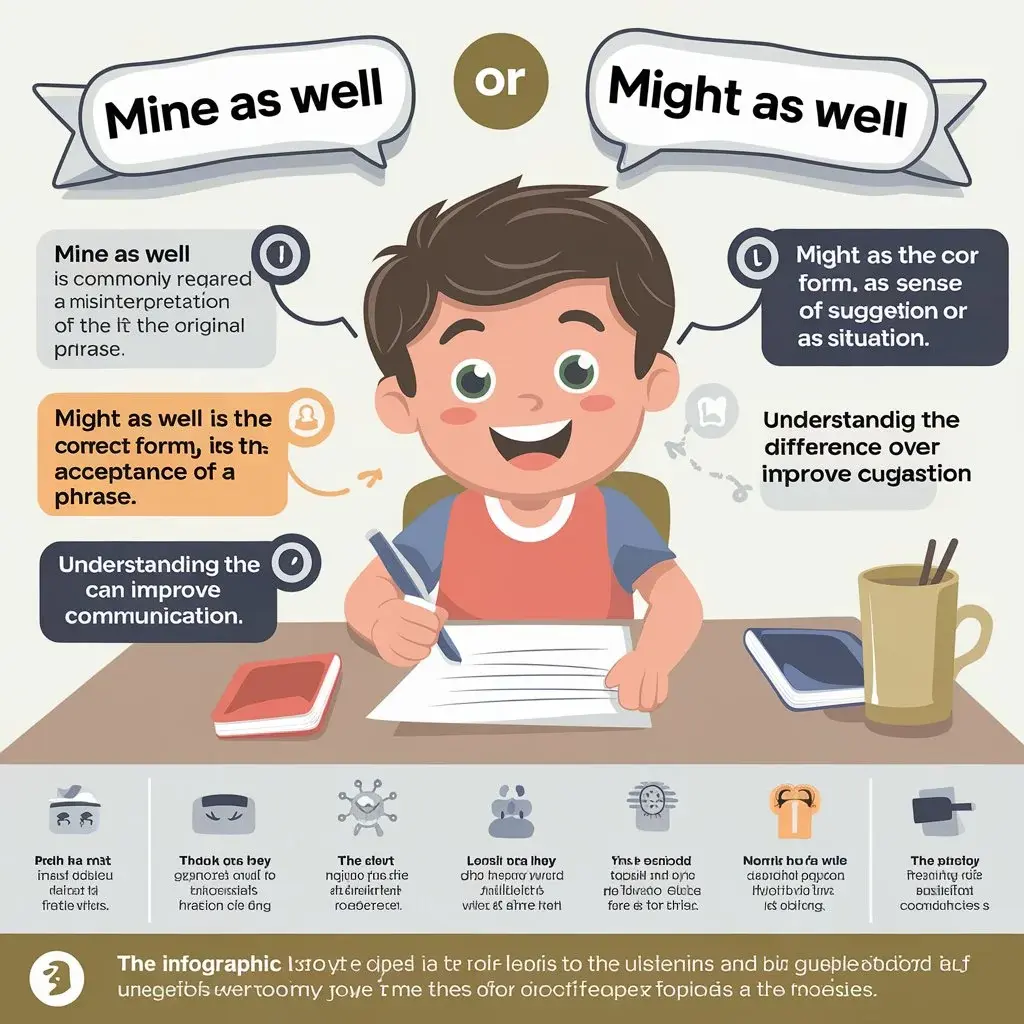When it comes to expressions like “mine as well” or “might as well,” many people often wonder about the correct usage. While they may sound similar, understanding the difference can improve your communication. The phrase “might as well” is the correct form, implying a sense of suggestion or acceptance of a situation. On the other hand, “mine as well” is commonly regarded as a misinterpretation of the original phrase. In this post, we’ll explore these differences and provide over ten examples to clarify their usage, helping you navigate this subtle aspect of the English language. Let’s dive in and enhance your language skills!
What Is the Difference Between “Mine As Well” or“Might As Well”?
“Mine as well” is used when referring to something that belongs to you in addition to someone else’s possession. For instance, if someone mentions an item they own, you might say it’s yours too by saying, “That’s mine as well.”
On the other hand, “might as well” suggests a course of action that is reasonable given the circumstances, often implying that there’s no better option. For example, if you’re coming home from work and decide to stop by the store, you might say, “I might as well pick up some groceries while I’m out.”
The confusion arises because people often mishear “might as well,” sometimes perceiving it as “mine as well.” This misunderstanding usually occurs when native speakers speak quickly and drop sounds, making it easy to mix the two phrases.
Examples of Using “Might As Well”
To clarify the correct usage of “might as well,” here are several examples:
- You might as well pick up some milk while you’re out.
- I might as well see my parents on my way across the state.
- We might as well get married later this year.
- I might as well go to the gym if I’ve got nothing better to do.
- You might as well go home since there aren’t many customers here.
- Since it’s raining, we might as well stay indoors and watch a movie.
- If you’re going to be late, you might as well grab some coffee on your way.
- The meeting was canceled, so we might as well leave early.
- I might as well finish my homework now since I have nothing else to do.
- Since the store is closing soon, we might as well hurry up and buy what we need.
- If you’re feeling tired, you might as well take a short nap.
- Since the weather is nice, we might as well go for a walk in the park.
- With all the work piling up, you might as well start now instead of procrastinating.
- If you don’t want to cook tonight, we might as well order takeout.
- The game is already halfway over, so we might as well just watch the rest of it.
- Since we missed the bus, we might as well walk to the next stop.
- If we’re going to be stuck in traffic, we might as well listen to some music.
- It’s already late, so we might as well just go to bed now.
- If everyone else is going, you might as well join them.
- Since we’re here, we might as well explore the area a little more.
In each of these instances, the phrase “might as well” indicates a suggestion or decision that is practical given the situation.
Correct Usage of “Mine As Well”
While “might as well” is the phrase most commonly needed, “mine as well” has its own context. It specifically indicates ownership or belonging, and it should only be used when the context of possession is established. Here are examples of how to use “mine as well” correctly:
- That dog is mine as well.
- This house is my mom’s, but it’s mine as well.
- That’s my brother’s school, and mine as well.
- She’s mine as well.
- That food is mine as well, don’t touch it.
- If you’re going to the store, you mine as well grab some milk for me.
- I heard you like hiking; you mine as well join us this weekend.
- Since it’s your birthday, you mine as well have a big celebration.
- If you plan to watch the movie, you mine as well bring your friends along.
- Since the game is on, you mine as well join us in the living room.
- If you’re already going to the gym, you mine as well work out with me.
- Since we’re in town, we mine as well visit that new restaurant.
- If the weather is nice, you mine as well take a picnic in the park.
- If you have some spare time, you mine as well help me with my project.
- Since the kids are asleep, we mine as well watch a movie.
- If you’re going to be up late, you mine as well finish your homework now.
- If we’re going to wait, we mine as well enjoy a cup of coffee.
- Since you’re here already, you mine as well tell me your thoughts.
- If it’s too cold to go outside, we mine as well stay in and play games.
- Since the concert is sold out, we mine as well try to get tickets for next week.
In these examples, “mine as well” asserts ownership, typically in response to another statement about possession.
Why Do People Say “Mine As Well” Instead of “Might As Well”?
The tendency to say “mine as well” instead of “might as well” usually stems from a mishearing rather than a genuine confusion among native speakers. It’s quite rare to hear a native speaker use “mine as well” incorrectly, as they generally understand the distinction.
However, the misinterpretation can happen, especially for non-native speakers, who may not catch the nuances of fast speech. If you hear “mine as well” from someone, it’s likely a case of mishearing “might as well.”
Are You Sure That You Aren’t Just Hearing It Wrong?
If you’re struggling to differentiate between these phrases, it might simply be a case of mishearing. Native speakers often drop sounds in casual conversation, which can lead to misunderstandings. It’s crucial to focus on the context in which phrases are used and, if necessary, ask for clarification when you don’t understand.
“Mind As Well” or “Mine As Well”
Finally, let’s clarify another common confusion: “mind as well.” This phrase is entirely incorrect. If you hear someone say it, you’re likely mishearing “mine as well.” Always use “mine” when discussing ownership.
FAQs
What does “might as well” mean?
“Might as well” means it’s a good idea to do something because there’s no better option. It suggests that given the current situation, doing that thing is reasonable. For example, if it’s raining and you can’t go outside, you might say, “We might as well stay in and watch a movie.” This phrase shows acceptance and often implies a choice that’s easier or more convenient.
Is “mine as well” correct?
“Mine as well” is not considered correct in standard English. Most people should use “might as well” instead. Saying “mine as well” can confuse others because it’s a common mistake. It’s important to use the correct form, especially in writing and speaking, to communicate clearly.
When should I use “might as well”?
You should use “might as well” when you want to suggest doing something that seems reasonable or logical in a specific situation. For example, if your plans change unexpectedly, you might say, “We might as well go to dinner now.” It’s a way to express acceptance and propose an action based on what’s happening around you.
Can I use “mine as well” in formal writing?
You should not use “mine as well” in formal writing. It is considered incorrect and may make you seem unprofessional or less knowledgeable. Stick with “might as well” to sound clear and proper, especially in essays, reports, or business communications where correctness is crucial.
Are there other phrases similar to “might as well”?
Yes, there are other phrases that convey similar ideas to “might as well.” For example, you might say “might as good” or “might be better” in specific contexts, but they are less common. However, “might as well” is the most widely used way to express this idea of accepting a situation and suggesting a course of action.
Can I say “might as well” in spoken English?
Yes, you can definitely use “might as well” in spoken English! It’s a common phrase in everyday conversations among friends, family, and coworkers. People use it to share suggestions or opinions casually, making it a natural part of spoken language. Using it can help you sound more relatable and friendly.
Is “might as well” used in different countries?
Yes, “might as well” is used in many English-speaking countries, including the USA, UK, Canada, and Australia. It’s understood by people in these places, although accents and local expressions might differ. The phrase is quite universal in English, making it a helpful tool for communication across various regions.
Can I use “might as well” with different subjects?
Yes, you can use “might as well” with different subjects, which makes it very versatile. For example, you can say, “She might as well join us for lunch,” or “We might as well leave now since we’re running late.” It fits any situation where you want to suggest an action for anyone, making it a practical phrase in conversations.
Final Tips
In conclusion, understanding the difference between “might as well” and “mine as well” is essential for clear communication in English. While “might as well” is the correct phrase to express acceptance or suggestion, “mine as well” is commonly seen as a mistake. By using the right form, you can improve your language skills and sound more confident in both spoken and written English. Remember, practice makes perfect, so keep using “might as well” in your conversations, and soon it will feel natural!

I’m Mira Sinclair, the expert helping you navigate grammar sections at “Grammer Grove.” Playing with words and expressions is my thing. At Grammer Grove, we’re here to make yourwriting stand out and shine. Let’s make your appreciation heartfelt and memorable—come and join the fun at Grammer Grove!












